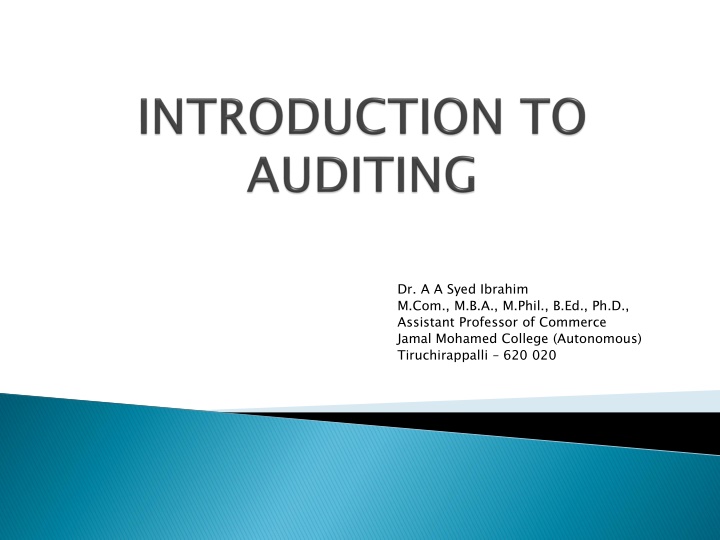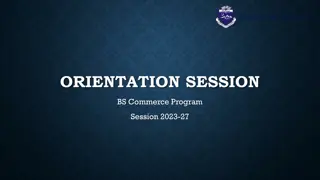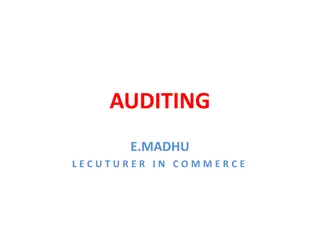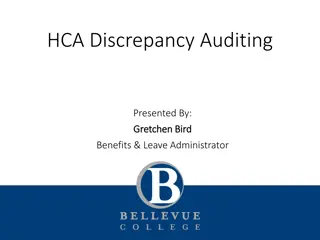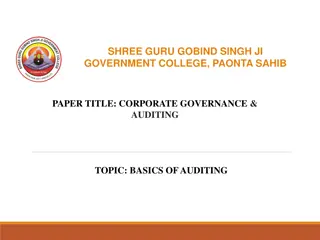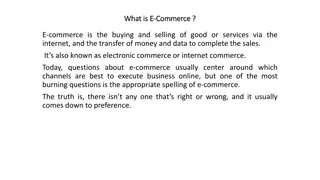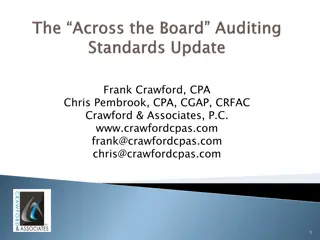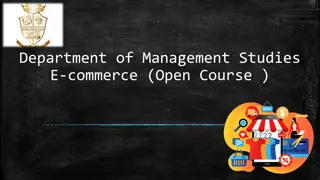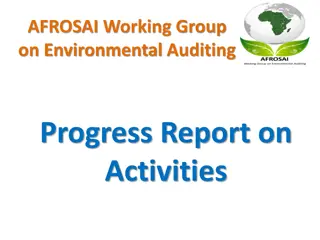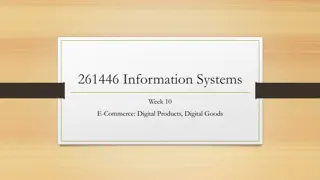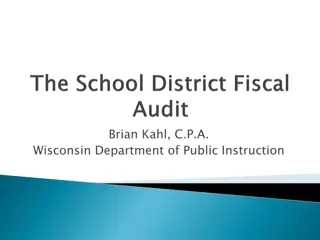Evolution and Significance of Auditing in Commerce
Auditing, derived from the Latin term "audire," has a long history dating back to ancient civilizations. It plays a crucial role in verifying financial information and ensuring transparency in business operations. The process involves systematic examination of accounts to provide a true and fair view of a business's financial health. Through audits, financial controls are enforced to safeguard against fraud and ensure proper utilization of resources.
Download Presentation

Please find below an Image/Link to download the presentation.
The content on the website is provided AS IS for your information and personal use only. It may not be sold, licensed, or shared on other websites without obtaining consent from the author.If you encounter any issues during the download, it is possible that the publisher has removed the file from their server.
You are allowed to download the files provided on this website for personal or commercial use, subject to the condition that they are used lawfully. All files are the property of their respective owners.
The content on the website is provided AS IS for your information and personal use only. It may not be sold, licensed, or shared on other websites without obtaining consent from the author.
E N D
Presentation Transcript
Dr. A A Syed Ibrahim M.Com., M.B.A., M.Phil., B.Ed., Ph.D., Assistant Professor of Commerce Jamal Mohamed College (Autonomous) Tiruchirappalli 620 020
The term audit is derived from the Latin term audire, which means to hear. In early days an auditor used to listen to the accounts read over by an accountant in order to check them. Auditing is as old as accounting. It was in use in all ancient countries such as Mesopotamia, Greece, Egypt. Rome, U.K. and India. The Vedas contain reference to accounts and auditing. Arthasashthra by Kautilya detailed rules for accounting and auditing of public finances.
Spicer and Pegler: "Auditing is such an examination of books of accounts and vouchers of business, as will enable the auditors to satisfy himself that the balance sheet is properly drawn up, so as to give a true and fair view of the state of affairs of the business and that the profit and loss account gives true and fair view of the profit/loss for the financial period, according to the best of information and explanation given to him and as shown by the books; and if not, in what respect he is not satisfied." Prof. L.R.Dicksee. "auditing is an examination of accounting records undertaken with a view to establish whether they correctly and completely reflect the transactions to which they relate.
The book "an introduction to Indian Government accounts and audit" "issued by the Comptroller and Auditor General of India, defines audit an instrument of financial control. It acts as a safeguard on behalf of the proprietor (whether an individual or group of persons) against extravagance, carelessness or fraud on the part of the proprietor's agents or servants in the realization and utilisation of the money or other assets and it ensures on the proprietor's behalf that the accounts maintained truly represent facts and that the expenditure has been incurred with due regularity and propriety. The agency employed for this purpose is called an auditor."
Audit is a systematic and scientific examination of the books of accounts of a A. business; Audit is undertaken by an independent person or body of persons who are B. duly qualified for the job. Audit is a verification of the results shown by the profit and loss account and C. the state of affairs as shown by the balance sheet. Audit is a critical review of the system of accounting and internal control. D. Audit is done with the help of vouchers, documents, information and E. explanations received from the authorities.
The auditor has to satisfy himself with the authenticity of the financial statements and report that they exhibit a true and fair view of the state of affairs of the concern. The auditor has to inspect, compare, check, review, scrutinize the vouchers supporting the transactions and examine correspondence, minute books of share holders, Association and Articles of association etc., in order to establish correctness of the books of accounts. F. G. directors, Memorandum of
1. To Examine the Accuracy of the Books of Accounts An auditor has to examine the accuracy of the books of accounts, vouchers and other records to certify that Profit and Loss Account discloses a true and fair view of profit or loss for the financial period and the Balance Sheet on a given date is properly drawn up to exhibit a true and fair view of the state of affairs of the business. 2. To Express Opinion on Financial Statements After verifying the accuracy of the books of accounts, the auditor should express his expert opinion on the truthness and fairness of the financial statements. Finally, the auditor should certify that the Profit and Loss Account and Balance Sheet represent a true and fair view of the state of affairs of the company for a particular period.
Detection And Prevention of Errors The Institute of Chartered Accountants of India defines an error as, an unintentional mistake in the books of accounts. Errors are the carelessness on the part of the person preparing the books of accounts or committing mistakes in the process of keeping accounting records.
1. CLERICAL ERROR Errors that are committed in posting, totalling and balancing of accounts are called as Clerical Errors. These errors may or may not affect the agreement of the Trial Balance. Types of Clerical Errors: (A) Errors of Omission: When a transaction is not recorded or partially recorded in the books of account is known as Errors of Omission. Usually, it arises due to the mistake of clerks. Error of omission can occur due to complete omission or partial omission. (1) Error of Complete Omission: When a transaction is totally or completely omitted to be recorded in the books it is called as Error of Complete Omission . It will not affect the agreement of the Trial Balance and hence it is difficult to detect such errors. (2) Errors of Partial Omission: When a transaction is partly recorded, it is called as Error of Partial Omission . Such kind of errors can be detected easily as it will affect the agreement of the Trial Balance.
(B) Errors of Commission: Errors which are not supposed to be committed or done by carelessness is called as Error of Commission. Such errors arise in the following ways: (1) Error of Recording, (2) Error of Posting, (3) Error of casting, or Error of Carry-forward. (1) Error of Recording: The error arises when any transaction is incorrectly recorded in the books of original entry. This error does not affect the Trial Balance. (2) Error of Posting : The error arises when a transaction is correctly journalised but wrongly posted in ledger account. (3) Error of casting, or Error of Carry-forward: The error arises when a mistake is committed in carrying forward a total of one page on the next page. This error affects the Trial Balance.
2. ERROR OF DUPLICATION Errors of duplication arise when an entry in a book of original entry has been made twice and has also been posted twice. These errors do not affect the agreement of trial balance, hence it can t located easily. 3. ERROR OF COMPENSATION (or) COMPENSATING ERRORS When one error on debit side is compensated by another entry on credit side to the same extent is called as Compensating Error. They are also called as Off-setting Errors. These errors do not affect the agreement of trial balance and hence it cannot be located. 4. ERROR OF PRINCIPLE An error of principle occurs when the generally accepted principles of accounting are not followed while recording the transactions in the books of account. These errors may be due to lack of knowledge on accounting principles and concepts. Errors of principle do not affect the trial balance and hence it is very difficult for an auditor to locate such type of errors.
Detection and Prevention of Frauds Fraud is the intentional or wilful misrepresentation of transactions in the books of accounts by the dishonest employees to deceive somebody. Thus detection and prevention of fraud is of great importance and constituents an important duty of an auditor. Fraud can be classified as:
1. MISAPPROPRIATION OF CASH This is a very common method of misappropriation of cash by the dishonest employees by giving false representation in the books of accounts intentionally. In order to detect and prevent misappropriation, the auditor should verify the system of internal check in operation and by making a detailed examination of records and documents. Cash may be misappropriated in the following ways: (1) By omitting to enter cash which has been received. (2) By accounting less amount on the receipt side of cash book than the actual amount received. (3) By recording fictitious entries on the payment side of cash book. (4) By accounting more amount on payments side of cash book than the actual amount paid. (5) Teeming and Lading of Fraud which means cash received from one customer is misappropriated and remittance received from another debtor is posted to the first debtors account.
2. MISAPPROPRIATION OF GOODS Fraud which takes places in respect of goods is Misappropriation of Goods. Such a type of fraud is difficult to detect and usually takes place where the goods are less bulky and are of high value. By showing less amount of purchase than actual purchase in the books of accounts. By showing issue of material more than actual issue made. By showing good materials as obsolete or poor line of goods. By showing fictitious entries in the books of accounts.
3. MANIPULATION OF ACCOUNTS There is a very common practice almost in every organization, some dishonest employees have intention to commit this type of fraud. Manipulation of accounts is the procedure to alter books of accounts in such a way that there will be an increase or decrease in the amount of profit to achieve some personal objectives of the high officials. It is very difficult for the auditors to identify such frauds which may be due to manipulation of accounts.
THANK YOU THANK YOU
